- Home
- Fyodor Dostoyevsky
Poor Folk Anthology Page 46
Poor Folk Anthology Read online
Page 46
But at this point a strange thing happened. I was so accustomed to think and imagine everything from books, and to picture everything in the world to myself just as I had made it up in my dreams beforehand, that I could not all at once take in this strange circumstance. What happened was this: Liza, insulted and crushed by me, understood a great deal more than I imagined. She understood from all this what a woman understands first of all, if she feels genuine love, that is, that I was myself unhappy.
The frightened and wounded expression on her face was followed first by a look of sorrowful perplexity. When I began calling myself a scoundrel and a blackguard and my tears flowed (the tirade was accompanied throughout by tears) her whole face worked convulsively. She was on the point of getting up and stopping me; when I finished she took no notice of my shouting: "Why are you here, why don't you go away?" but realised only that it must have been very bitter to me to say all this. Besides, she was so crushed, poor girl; she considered herself infinitely beneath me; how could she feel anger or resentment? She suddenly leapt up from her chair with an irresistible impulse and held out her hands, yearning towards me, though still timid and not daring to stir … . At this point there was a revulsion in my heart too. Then she suddenly rushed to me, threw her arms round me and burst into tears. I, too, could not restrain myself, and sobbed as I never had before.
"They won't let me … I can't be good!" I managed to articulate; then I went to the sofa, fell on it face downwards, and sobbed on it for a quarter of an hour in genuine hysterics. She came close to me, put her arms round me and stayed motionless in that position. But the trouble was that the hysterics could not go on for ever, and (I am writing the loathsome truth) lying face downwards on the sofa with my face thrust into my nasty leather pillow, I began by degrees to be aware of a far-away, involuntary but irresistible feeling that it would be awkward now for me to raise my head and look Liza straight in the face. Why was I ashamed? I don't know, but I was ashamed. The thought, too, came into my overwrought brain that our parts now were completely changed, that she was now the heroine, while I was just a crushed and humiliated creature as she had been before me that night—four days before … . And all this came into my mind during the minutes I was lying on my face on the sofa.
My God! surely I was not envious of her then.
I don't know, to this day I cannot decide, and at the time, of course, I was still less able to understand what I was feeling than now. I cannot get on without domineering and tyrannising over someone, but … there is no explaining anything by reasoning and so it is useless to reason.
I conquered myself, however, and raised my head; I had to do so sooner or later … and I am convinced to this day that it was just because I was ashamed to look at her that another feeling was suddenly kindled and flamed up in my heart … a feeling of mastery and possession. My eyes gleamed with passion, and I gripped her hands tightly. How I hated her and how I was drawn to her at that minute! The one feeling intensified the other. It was almost like an act of vengeance. At first there was a look of amazement, even of terror on her face, but only for one instant. She warmly and rapturously embraced me.
Chapter 10
A quarter of an hour later I was rushing up and down the room in frenzied impatience, from minute to minute I went up to the screen and peeped through the crack at Liza. She was sitting on the ground with her head leaning against the bed, and must have been crying. But she did not go away, and that irritated me. This time she understood it all. I had insulted her finally, but … there's no need to describe it. She realised that my outburst of passion had been simply revenge, a fresh humiliation, and that to my earlier, almost causeless hatred was added now a PERSONAL HATRED, born of envy … . Though I do not maintain positively that she understood all this distinctly; but she certainly did fully understand that I was a despicable man, and what was worse, incapable of loving her. I know I shall be told that this is incredible—but it is incredible to be as spiteful and stupid as I was; it may be added that it was strange I should not love her, or at any rate, appreciate her love. Why is it strange? In the first place, by then I was incapable of love, for I repeat, with me loving meant tyrannising and showing my moral superiority. I have never in my life been able to imagine any other sort of love, and have nowadays come to the point of sometimes thinking that love really consists in the right— freely given by the beloved object—to tyrannise over her.
Even in my underground dreams I did not imagine love except as a struggle. I began it always with hatred and ended it with moral subjugation, and afterwards I never knew what to do with the subjugated object. And what is there to wonder at in that, since I had succeeded in so corrupting myself, since I was so out of touch with "real life," as to have actually thought of reproaching her, and putting her to shame for having come to me to hear "fine sentiments"; and did not even guess that she had come not to hear fine sentiments, but to love me, because to a woman all reformation, all salvation from any sort of ruin, and all moral renewal is included in love and can only show itself in that form.
I did not hate her so much, however, when I was running about the room and peeping through the crack in the screen. I was only insufferably oppressed by her being here. I wanted her to disappear. I wanted "peace," to be left alone in my underground world. Real life oppressed me with its novelty so much that I could hardly breathe.
But several minutes passed and she still remained, without stirring, as though she were unconscious. I had the shamelessness to tap softly at the screen as though to remind her … . She started, sprang up, and flew to seek her kerchief, her hat, her coat, as though making her escape from me … . Two minutes later she came from behind the screen and looked with heavy eyes at me. I gave a spiteful grin, which was forced, however, to KEEP UP APPEARANCES, and I turned away from her eyes.
"Good-bye," she said, going towards the door.
I ran up to her, seized her hand, opened it, thrust something in it and closed it again. Then I turned at once and dashed away in haste to the other corner of the room to avoid seeing, anyway … .
I did mean a moment since to tell a lie—to write that I did this accidentally, not knowing what I was doing through foolishness, through losing my head. But I don't want to lie, and so I will say straight out that I opened her hand and put the money in it … from spite. It came into my head to do this while I was running up and down the room and she was sitting behind the screen. But this I can say for certain: though I did that cruel thing purposely, it was not an impulse from the heart, but came from my evil brain. This cruelty was so affected, so purposely made up, so completely a product of the brain, of books, that I could not even keep it up a minute—first I dashed away to avoid seeing her, and then in shame and despair rushed after Liza. I opened the door in the passage and began listening.
"Liza! Liza!" I cried on the stairs, but in a low voice, not boldly. There was no answer, but I fancied I heard her footsteps, lower down on the stairs.
"Liza!" I cried, more loudly.
No answer. But at that minute I heard the stiff outer glass door open heavily with a creak and slam violently; the sound echoed up the stairs.
She had gone. I went back to my room in hesitation. I felt horribly oppressed.
I stood still at the table, beside the chair on which she had sat and looked aimlessly before me. A minute passed, suddenly I started; straight before me on the table I saw … . In short, I saw a crumpled blue five- rouble note, the one I had thrust into her hand a minute before. It was the same note; it could be no other, there was no other in the flat. So she had managed to fling it from her hand on the table at the moment when I had dashed into the further corner.
Well! I might have expected that she would do that. Might I have expected it? No, I was such an egoist, I was so lacking in respect for my fellow-creatures that I could not even imagine she would do so. I could not endure it. A minute later I flew like a madman to dress, flinging on what I could at random and ran headlong after her. She co
uld not have got two hundred paces away when I ran out into the street.
It was a still night and the snow was coming down in masses and falling almost perpendicularly, covering the pavement and the empty street as though with a pillow. There was no one in the street, no sound was to be heard. The street lamps gave a disconsolate and useless glimmer. I ran two hundred paces to the cross-roads and stopped short.
Where had she gone? And why was I running after her?
Why? To fall down before her, to sob with remorse, to kiss her feet, to entreat her forgiveness! I longed for that, my whole breast was being rent to pieces, and never, never shall I recall that minute with indifference. But—what for? I thought. Should I not begin to hate her, perhaps, even tomorrow, just because I had kissed her feet today? Should I give her happiness? Had I not recognised that day, for the hundredth time, what I was worth? Should I not torture her?
I stood in the snow, gazing into the troubled darkness and pondered this.
"And will it not be better?" I mused fantastically, afterwards at home, stifling the living pang of my heart with fantastic dreams. "Will it not be better that she should keep the resentment of the insult for ever? Resentment—why, it is purification; it is a most stinging and painful consciousness! Tomorrow I should have defiled her soul and have exhausted her heart, while now the feeling of insult will never die in her heart, and however loathsome the filth awaiting her—the feeling of insult will elevate and purify her … by hatred … h'm! … perhaps, too, by forgiveness … . Will all that make things easier for her though? … "
And, indeed, I will ask on my own account here, an idle question: which is better—cheap happiness or exalted sufferings? Well, which is better?
So I dreamed as I sat at home that evening, almost dead with the pain in my soul. Never had I endured such suffering and remorse, yet could there have been the faintest doubt when I ran out from my lodging that I should turn back half-way? I never met Liza again and I have heard nothing of her. I will add, too, that I remained for a long time afterwards pleased with the phrase about the benefit from resentment and hatred in spite of the fact that I almost fell ill from misery.
… .
Even now, so many years later, all this is somehow a very evil memory. I have many evil memories now, but … hadn't I better end my "Notes" here? I believe I made a mistake in beginning to write them, anyway I have felt ashamed all the time I've been writing this story; so it's hardly literature so much as a corrective punishment. Why, to tell long stories, showing how I have spoiled my life through morally rotting in my corner, through lack of fitting environment, through divorce from real life, and rankling spite in my underground world, would certainly not be interesting; a novel needs a hero, and all the traits for an anti-hero are EXPRESSLY gathered together here, and what matters most, it all produces an unpleasant impression, for we are all divorced from life, we are all cripples, every one of us, more or less. We are so divorced from it that we feel at once a sort of loathing for real life, and so cannot bear to be reminded of it. Why, we have come almost to looking upon real life as an effort, almost as hard work, and we are all privately agreed that it is better in books. And why do we fuss and fume sometimes? Why are we perverse and ask for something else? We don't know what ourselves. It would be the worse for us if our petulant prayers were answered. Come, try, give any one of us, for instance, a little more independence, untie our hands, widen the spheres of our activity, relax the control and we … yes, I assure you … we should be begging to be under control again at once. I know that you will very likely be angry with me for that, and will begin shouting and stamping. Speak for yourself, you will say, and for your miseries in your underground holes, and don't dare to say all of us— excuse me, gentlemen, I am not justifying myself with that "all of us." As for what concerns me in particular I have only in my life carried to an extreme what you have not dared to carry halfway, and what's more, you have taken your cowardice for good sense, and have found comfort in deceiving yourselves. So that perhaps, after all, there is more life in me than in you. Look into it more carefully! Why, we don't even know what living means now, what it is, and what it is called? Leave us alone without books and we shall be lost and in confusion at once. We shall not know what to join on to, what to cling to, what to love and what to hate, what to respect and what to despise. We are oppressed at being men—men with a real individual body and blood, we are ashamed of it, we think it a disgrace and try to contrive to be some sort of impossible generalised man. We are stillborn, and for generations past have been begotten, not by living fathers, and that suits us better and better. We are developing a taste for it. Soon we shall contrive to be born somehow from an idea. But enough; I don't want to write more from "Underground."
[The notes of this paradoxalist do not end here, however. He could not refrain from going on with them, but it seems to us that we may stop here.]
Crime and Punishment
Fyodor Mikhailovich Dostoyevsky
(Translator: Constance Garnett)
Table of Contents
Crime and Punishment Translator's Preface
Part 1 Chapter 1
Chapter 2
Chapter 3
Chapter 4
Chapter 5
Chapter 6
Chapter 7
Part 2 Chapter 1
Chapter 2
Chapter 3
Chapter 4
Chapter 5
Chapter 6
Chapter 7
Part 3 Chapter 1
Chapter 2
Chapter 3
Chapter 4
Chapter 5
Chapter 6
Part 4 Chapter 1
Chapter 2
Chapter 3
Chapter 4
Chapter 5
Chapter 6
Part 5 Chapter 1
Chapter 2
Chapter 3
Chapter 4
Chapter 5
Part 6 Chapter 1
Chapter 2
Chapter 3
Chapter 4
Chapter 5
Chapter 6
Chapter 7
Chapter 8
Part 7 Epilogue Chapter 1
Chapter 2
Translator's Preface
A few words about Dostoevsky himself may help the English reader to understand his work.
Dostoevsky was the son of a doctor. His parents were very hard- working and deeply religious people, but so poor that they lived with their five children in only two rooms. The father and mother spent their evenings in reading aloud to their children, generally from books of a serious character.
Though always sickly and delicate Dostoevsky came out third in the final examination of the Petersburg school of Engineering. There he had already begun his first work, Poor Folk.
This story was published by the poet Nekrassov in his review and was received with acclamations. The shy, unknown youth found himself instantly something of a celebrity. A brilliant and successful career seemed to open before him, but those hopes were soon dashed. In 1849 he was arrested.
Though neither by temperament nor conviction a revolutionist, Dostoevsky was one of a little group of young men who met together to read Fourier and Proudhon. He was accused of "taking part in conversations against the censorship, of reading a letter from Byelinsky to Gogol, and of knowing of the intention to set up a printing press." Under Nicholas I. (that "stern and just man," as Maurice Baring calls him) this was enough, and he was condemned to death. After eight months' imprisonment he was with twenty-one others taken out to the Semyonovsky Square to be shot. Writing to his brother Mihail, Dostoevsky says: "They snapped words over our heads, and they made us put on the white shirts worn by persons condemned to death. Thereupon we were bound in threes to stakes, to suffer execution. Being the third in the row, I concluded I had only a few minutes of life before me. I thought of you and your dear ones and I contrived to kiss Plestcheiev and Dourov, who were next to me, and to bid them farewell.
Suddenly the troops beat a tattoo, we were unbound, brought back upon the scaffold, and informed that his Majesty had spared us our lives." The sentence was commuted to hard labour.
One of the prisoners, Grigoryev, went mad as soon as he was untied, and never regained his sanity.

 The Eternal Husband
The Eternal Husband Crime and Punishment
Crime and Punishment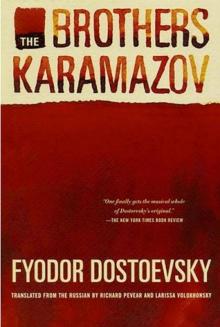 The Brothers Karamazov
The Brothers Karamazov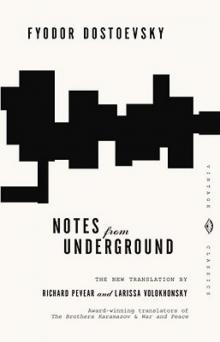 Notes From Underground
Notes From Underground The Idiot
The Idiot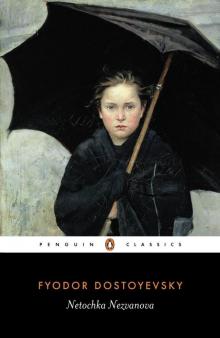 Netochka Nezvanova (Penguin ed.)
Netochka Nezvanova (Penguin ed.)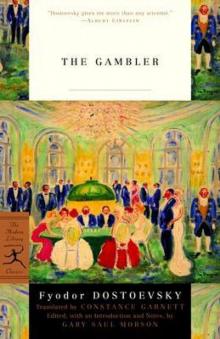 The Gambler
The Gambler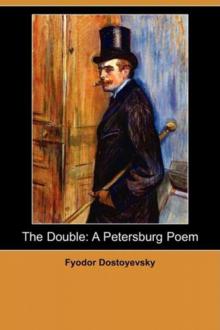 The Double
The Double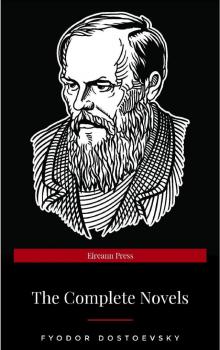 Poor Folk Anthology
Poor Folk Anthology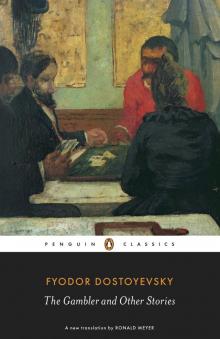 The Gambler and Other Stories (Penguin ed.)
The Gambler and Other Stories (Penguin ed.) Prestuplenie i nakazanie. English
Prestuplenie i nakazanie. English Notes from the Underground
Notes from the Underground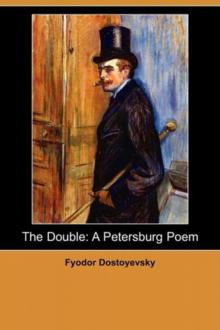 The Double: A Petersburg Poem
The Double: A Petersburg Poem White Nights and Other Stories / The Novels of Fyodor Dostoevsky, Volume X
White Nights and Other Stories / The Novels of Fyodor Dostoevsky, Volume X Complete Works of Fyodor Dostoyevsky
Complete Works of Fyodor Dostoyevsky Poor Folk and Other Stories
Poor Folk and Other Stories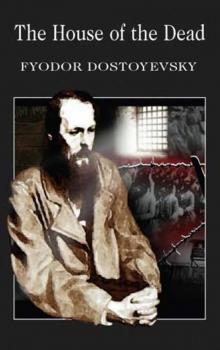 The House of the Dead
The House of the Dead